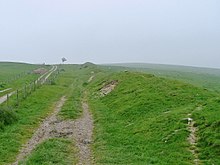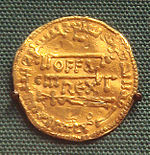Offa of Mercien
Offa († July 26, 796 ) was King of Mercien in what is now Great Britain from 757 to 796.
King of England
He was the first Anglo-Saxon to call himself the King of England (774). At the end of his reign he actually ruled all of England south of the Humber . He acted defensively against Wales and built a protective wall on the border, Offa's Dyke .
Offa's accession to power ended a period of turmoil in Mercia after Bethelbald's death in 757 , when Beornrad came to power for a short time, but Offa overthrew and drove him in 757. The Kingdom of Wessex used this phase of weakness to break away from the supremacy of Mercia. In order to regain a hegemonic position in England for Mercia , Offa initially turned to the southeast. In Kent he succeeded in 764 in installing Heahberht, a king who was entirely dependent on him. At the beginning of the 770s, however, there was an uprising against the rule of Mercias in the southeast, in which the kings of Sussex also took part. The latter appear from 772 onwards only with the title dux (Duke), so that it can be assumed that Offa was able to prevail against them. Offa also took military action against Kent and the Anglo-Saxon Chronicle records a battle at Otford in 776 without naming the victor. Since Kent was able to keep a certain independence in the next few years, Offa can hardly have won the battle. Nevertheless, Offa's supremacy in England was now largely without serious competitors, so that Offa was the first monarch to call himself King of England (Rex Anglorum) in 774.
This established position of power of Offa also allowed him to now dare to confront Wessex. In 779 he defeated King Cynewulf of Wessex at the Battle of Bensington (Oxfordshire) and recaptured the area of Berkshire that had previously belonged to Mercia. In 786 Cynewulf was killed and Beorhtric became the new king of Wessex; Egbert raised claims to the throne against him , but Offa took the side of Beorhtric, to whom he gave his daughter Eadburh as his wife in 789. The penny coins introduced by Offa in Mercia in 786 were also used in Wessex. It was evidently relatively peaceful on the border between Mercia and Wessex. B. when building a bridge in Oxford , no additional fortifications were used; however, new fortifications were built in Hereford on the Welsh border.
Alliances and Conflicts
Offa received a further increase in power in 794 with the death of the king of East Anglia , Æthelberht II. , Whom Offa himself had killed (according to the Anglo-Saxon Chronicle) and whose empire he incorporated Mercia.
In addition to these battles with the Anglo-Saxon empires, Offa was constantly involved in battles with the Welsh on its western border. The first battle took place near Hereford as early as 760. Campaigns for the years 778, 784 and 796 are documented below. In order to secure himself on this front, Offa had the border wall named after him built, a 270 km long, 2.50 m high structure.
At first there were very friendly relations between Offa and the Frankish Empire under Charlemagne , who addressed Offa in a letter as a "brother", but without placing him on a completely equal footing with himself. Karl offered to marry off one of his sons to a daughter of Offa, Aelfflaed ; Karl rejected his counter offer to marry a daughter of Karl with Offa's son Ecgfrith . At times, Karl even closed his ports to English traders, and the admission of Egbert von Wessex in the Franconian Empire, the rival of Offa's protégé Beorhtric, strained mutual relations.
Relations between Offa and the Church were not free of tension either. Offa's plan was to elevate the diocese of Lichfield to a third archdiocese of England alongside York and Canterbury, in keeping with the growing role of his empire. After a synod led by Offa and Beorhtric had spoken out in favor of an archbishopric in Lichfield in 787, Pope Hadrian I initially agreed and awarded Bishop Higbert the pallium in 788. Soon after Offa's death, around the year 799 or shortly thereafter, the Archdiocese of Lichfield was abolished again.
Development of the coinage
The reform of the English silver coinage goes back to Offa. He had penny coins minted for the first time, with portraits of both himself and the queen on the coins. Mints existed in Canterbury, London and East Anglia. In the 1970s, heavy silver coins were minted and some gold coins based on the model of Arab denarii were minted.
To secure the succession, Offa had his son Ecgfrith crowned co-king in 787 . In fact, he took over the rule after Offa's death in 796, but died a few months later and Cenwulf succeeded him.
Offa's reign marked the climax of the power development of Mercia, which had to give up supremacy in England to its neighbor Wessex already three decades after Offa's death in 825.
literature
- James Campbell (Ed.): The Anglo-Saxons. Phaidon Press, Oxford 1982, ISBN 0-7148-2149-7 (several NDs).
- David Hill, Margaret Worthington (Eds.): Æthelbald and Offa. Two Eighth Century Kings of Mercia (= BAR. British Series. 383). Archaeopress, Oxford 2005, ISBN 1-8417-1687-1 .
- Frank M. Stenton : Anglo-Saxon England (= The Oxford History of England. 2). 3. Edition. Clarendon Press, Oxford 1971.
- Ian W. Walker: Mercia and the Making of England. Sutton, Stroud 2000, ISBN 0-7509-2131-5 .
| predecessor | Office | successor |
|---|---|---|
| Beornrad |
King of Mercien 757–796 |
Ecgfrith |
| personal data | |
|---|---|
| SURNAME | Offa of Mercien |
| BRIEF DESCRIPTION | King of Mercien (757–796); first Anglo-Saxon who called himself "King of England" |
| DATE OF BIRTH | 8th century |
| DATE OF DEATH | July 26, 796 |


